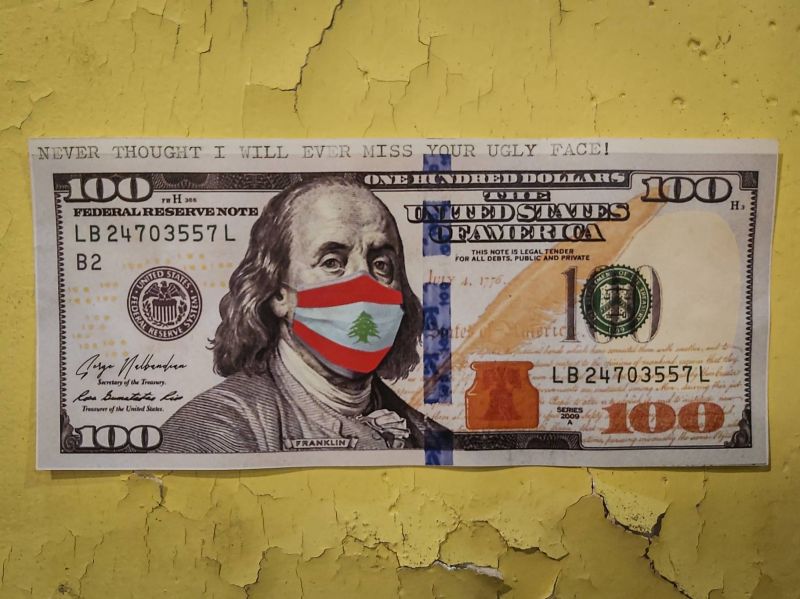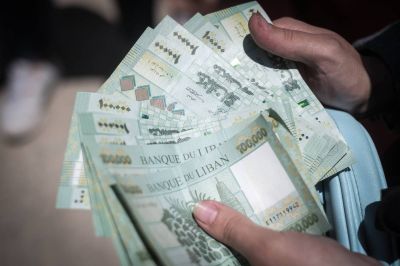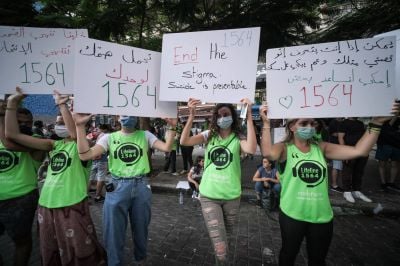
A $100 bill decorated with a COVID mask. (Credit: João Sousa/L'Orient Today/File photo)
BEIRUT — As 2023 nears its end, Lebanon’s annual inflation remains in the triple digits for the third consecutive year, according to the latest government-issued statistics, though has slowed due to decreased demand amid the Gaza war.
After a significant surge of 17.2 percent in October, Lebanon’s monthly Consumer Price Index (CPI) — calculated in Lebanese lira — went down to 2.6 percent in November 2023, according to data from the Central Administration of Statistics (CAS).
The new statistics come amid questions over whether the war in Gaza and along Lebanon’s southern border could impact inflation in Lebanon, which is already reeling from an economic crisis downturn since 2019.
Earlier this week, Abdallah al-Dardari, regional director at the United Nations Development Programme (UNDP), told L’Orient Today that while the UNDP had not yet observed “any noticeable impact on the country’s inflation yet due to the war in Gaza,” there is a reduced demand in the economy with consumption going down.
“This could potentially slow inflation down,” he added.
On a yearly level, the CPI saw a change of 211.9 percent compared to 215.4 percent in October, marking a decrease in inflation of 3.5 percent.
Still, some prices are on the rise, with communications costs increasing significantly by 29 percent in November 2023, compared to a decrease of 0.1 percent in October. However, the fees set by the Telecoms Ministry for phone lines (both landline and mobile) and the internet remained unchanged in November — the increased costs in this month’s data is due to the fact that information on price hikes from previous months (mainly September) has only just been made available, a CAS source told L’Orient Today on condition of anonymity.
Clothing and footwear prices increased by 8.2 percent month-on-month, while the prices of water, electricity and gas deflated by 1.7 percent, compared to a 10 percent increase last month. A slight deflation was also noted in transportation prices, which went down 0.7 percent.
New rent prices slightly went up, with a 2.8 percent monthly increase in November.
Prices in the health sector continue to deflate, going down by 1.1 percent, compared to a decrease of 0.3 percent in the previous month.
On a yearly level, alcoholic beverages and tobacco went up by 221.3 percent, compared to 249 percent in October. Inflation also slowed for water, electricity and gas prices, which rose by 145 percent compared to a previous increase of 151.8 percent. The same was noted for health prices (up 156.7 percent), transportation (up 142.7 percent), as well as restaurants and hotels (up 214.9 percent).
Prices increased somewhat evenly throughout Lebanon, with the North recording the highest monthly increase of 5.5 percent, followed by the South with an increase of 3.4 percent, Beirut with 2.2 percent, Mount Lebanon at two percent, and Bekaa at 1.9 percent. Nabatieh, on the other hand, recorded a deflation of 1.1 percent.
Communication prices increased unevenly across the country, with Beirut recording an increase of 37.4 percent, while Nabatieh and the North saw an increase of 18 percent.
Meanwhile, Banque du Liban (BDL) on Tuesday changed the rate on its official Sayrafa platform from LL85,000 to LL89,500 to the dollar.
The change marked the first time since 2020 that the Sayrafa rate and market exchange rates were aligned.
However, it remains unclear how prices and inflation for December may be impacted by the Sayrafa change as well as the holiday season and en masse returns of expats to Lebanon.


